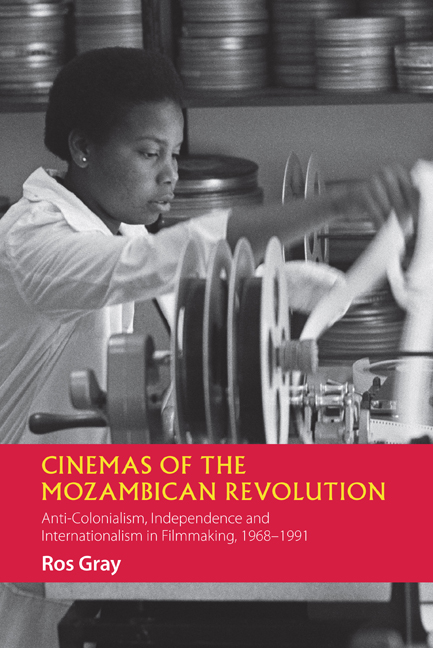 Cinemas of the Mozambican Revolution
Cinemas of the Mozambican Revolution Book contents
- Frontmatter
- Contents
- List of Images
- Acknowledgements
- Glossary
- Abbreviations
- Map of Mozambique
- Introduction
- 1 We Will Win! Filming the Armed Struggle in Mozambique, 1968–1973
- 2 From the Rovuma to the Maputo: Confluences of Independence, 1974–1975
- 3 Birth (of the Image) of a Nation: Delivering Cinema to the People, 1976–1978
- 4 Who Exactly is the Party? Didacticism, the Battle of Information and the Vanguard Party, 1977–1979
- 5 A New Symphony: Cinema and Television in the ‘Decade of Development’, 1980–1984
- 6 Let Them Come! Filmmaking on the Frontline against Apartheid, 1980–1989
- 7 The Time of the Leopards: The End of Socialist Fictions and the Beginnings of the Docu-Drama, 1985–1991
- Conclusion
- Bibliography
- Filmography
- Index
5 - A New Symphony: Cinema and Television in the ‘Decade of Development’, 1980–1984
Published online by Cambridge University Press: 16 July 2020
- Frontmatter
- Contents
- List of Images
- Acknowledgements
- Glossary
- Abbreviations
- Map of Mozambique
- Introduction
- 1 We Will Win! Filming the Armed Struggle in Mozambique, 1968–1973
- 2 From the Rovuma to the Maputo: Confluences of Independence, 1974–1975
- 3 Birth (of the Image) of a Nation: Delivering Cinema to the People, 1976–1978
- 4 Who Exactly is the Party? Didacticism, the Battle of Information and the Vanguard Party, 1977–1979
- 5 A New Symphony: Cinema and Television in the ‘Decade of Development’, 1980–1984
- 6 Let Them Come! Filmmaking on the Frontline against Apartheid, 1980–1989
- 7 The Time of the Leopards: The End of Socialist Fictions and the Beginnings of the Docu-Drama, 1985–1991
- Conclusion
- Bibliography
- Filmography
- Index
Summary
On 21 December 1979, the Lancaster House Agreement settled the terms of Zimbabwe's independence and announced the end of the armed struggle, which Frelimo had supported by offering sanctuary to the liberation movement ZANU (see Chapter 6). The elections in February 1980 resulted in a landslide victory for Robert Mugabe and it was anticipated that, without the support of the Rhodesian security forces, the MNR (known as Renamo after 1984) would wither away. It soon became apparent that this was not the case. Indeed the MNR quickly found a more powerful sponsor in the form of P. W. Botha's government in South Africa and attracted recruits who were disaffected by Frelimo. But at the advent of this new decade, it seemed that Mozambique would be able to build on the achievements of the first few years of independence, when forms of local democratic participation had been established, access to education and healthcare increased and the work of national reconstruction had begun. In November 1980, the first annual meeting of the Southern African Development Coordination Conference (SADCC) placed Mozambique at the heart of a plan to break regional dependency on South Africa through regional economic cooperation (see Chapter 6).
Within Mozambique, 1980 saw the launch of Frelimo's ten-year Prospective and Indicative Plan (PPI) that set out targets for increasing national production and industrialisation (though in fact it only remained in place until 1983). Intended to implement a great leap forward to modernisation, it proposed expanding industry to produce more basic consumer goods, transforming the countryside through the formation of collective villages and continued state control of abandoned farms that were mechanised and required centralised management. In 1980, Mozambique cemented its independence from the former regime with the introduction of a new currency – the metical – that replaced colonial money with banknotes and coins with portraits of Samora Machel and Eduardo Mondlane. For the time being it seemed that Mozambique's sovereignty was secure.
In 1979, with peace in the region finally in sight, Samora Machel had declared that the 1980s would be ‘the decade of victory over underdevelopment’. However, five years after independence the new nation was still in economic crisis and production had not returned to pre-1975 levels.
- Type
- Chapter
- Information
- Cinemas of the Mozambican RevolutionAnti-Colonialism, Independence and Internationalism in Filmmaking, 1968–1991, pp. 181 - 210Publisher: Boydell & BrewerPrint publication year: 2020
